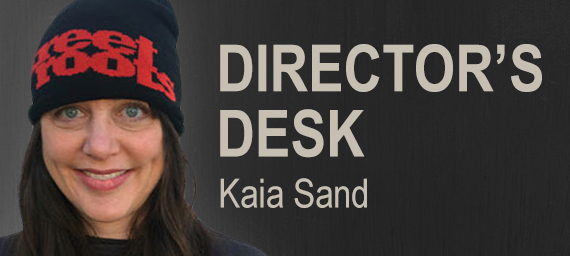It wasn’t much, but it was pizza – a small effort at fire prevention.
Mike D, a Street Roots vendor who coordinates action team outreach, and I crossed the busy St. Helens Road highway to the edge of Forest Park with his dog, Angel.
We knew from Portland Fire & Rescue that conditions are incredibly dangerous – dry winds, dry heat, dry ground, dry brush. So Mike and I headed out to one camp among trees and brush to deliver the fire-danger message. It was too dangerous to cook, so thus the pizzas. Folks gotta eat. The campers we found were receptive – they loved the forest. But they had few options. They were camped out on the outskirts, just surviving.
That was Wednesday.
On Friday, as we faced the worst air conditions of any city in the world, Street Roots made a quick decision to pause the next print edition of the paper, and instead focus our energy on raising money for our vendors so they can take the time off from trying to sell. They needed to get themselves inside if at all possible.
What a horrible choice we face: the healthiest place to be in COVID-19 is outside, and the healthiest place in these fires and smoke? Indoors.
One vendor showed up to the office Friday with a hospital band on his wrist. He had sought help for the damage from smoke inhalation, his lungs already compromised, but was released back to the streets. By the end of the day, thanks to swift action from the Cascadia outreach team, he was in a motel, breathing better.
Our beautiful state is ablaze in many regions, the skies wild and red up and down the West Coast. Entire towns are reduced to charred remains. We don’t know how many people are living in the blazing forests, just surviving all around our state, exposed to heavy smoke and worse.
And now fairgrounds and parking lots are filling up with evacuees. Some are temporarily homeless. Some are newly homeless, only days or hours removed from being burned out of their homes.
Street Roots started the Coronavirus Action Team back in March for vendors to respond to the immediate public health crisis and deliver accurate information about the virus to unhoused people. Now, in this additional public health crisis, some of the action team regrouped. We’ve begun to call them Street Roots Ambassadors as we look at this as a long-term effort.
Raven Drake, Mike D, and Angel trudged back up to Forest Park on Friday. My husband Jules volunteered to help, shouldering a box of bottled water and N95 masks up the forest trails. Most people, it seemed, had already left. Park Rangers and other city employees were elsewhere warning people.
This time, we had more options. The Joint Office of Homeless Services had opened up the Charles Jordan Community Center as another emergency shelter, and the city was coordinating ways to transport people and store their belongings. The city also expanded shelter capacity at the Oregon Convention Center. The scale of need is extraordinary.
All around the state people need these spaces. The uneven distribution of shelter and wealth has always been a public health crisis and the need right now is acute as people are evacuated from still-standing homes, evacuated from ruins, and evacuated from the streets.
There’s a great deal of additional need ahead – whether from fires or the torrent of loss when eviction moratoria end and rent comes due.
Motels are an essential option that serve both crises of the pandemic and the fires, as do, in fact, plenty of legal places to park RVs and cars.
And this large-scale response has to be for people who just evacuated, and the people for whom this is a longer term plight. Our scale of response should not just be about the timing of homelessness — how recently someone had an address before tragedy struck.
As even more people are suffering now in these tragic months of pandemic and fires, it is a challenge for all of us to rise to our humanity.



